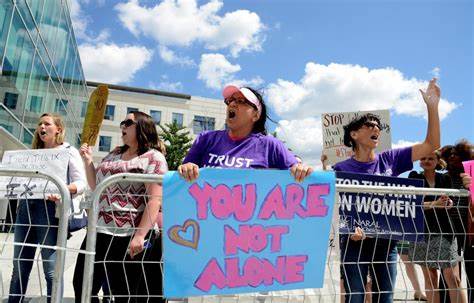(单词翻译:单击)
听力文本
Sexual Assault Remains Major Issue in US Higher Education
Few people understand the issue of sexual violence at colleges and universities in the United States better than Faith Ferber.
Ferber began her studies at American University, or AU, in Washington, D.C, in the autumn of 2013. By the following spring, the school was facing a major problem.
Messages between members of an unapproved all-male student group were published online, and gained widespread public attention. The messages showed the members openly discussing their involvement in illegal activities, including rape.
Ferber soon took action. She formed a group called Students Against Sexual Violence and organized protests. She got thousands of students to sign a statement demanding that school officials take action.
AU later dismissed 18 students for their involvement in the unapproved group. But before that took place, Ferber became a victim herself. In February 2015, she was sexually assaulted at a party.
She told VOA that, at first, AU officials seemed supportive of her and her case against her attacker. But after the investigation was over and the school began deciding what action to take, things changed.
Ferber said AU officials asked her to sign an agreement saying she would not discuss the details of her case with anyone. Ferber's attacker admitted responsibility, but the school did not dismiss that student as she requested.
She then learned that AU had violated Department of Education rules governing how colleges and universities should deal with sexual assault. So she contacted the agency, which eventually led to an investigation into the school. That investigation is ongoing.
Ferber continues to fight sexual violence through her work with Know Your IX. The organization teaches college students how to hold their schools accountable. Ferber argues that colleges and universities in the U.S. cannot let fear of critical media attention prevent them from supporting abuse victims. And, she adds, conversations about sex and sexual violence in America need to change.
"From a very young age we teach women that it's their responsibility to not get raped or to not be attacked," said Ferber. "That combined with a hesitancy to discuss sex and consent with young Americans, the result is that kids end up at college living ... on their own for the first time, barely adults ... with very, very little information, if not misinformation, on ... healthy sexual relationships."
Some schools are trying to better understand the problem. In October, the Association of American Universities, or AAU, released the findings of its 2019 Campus Climate Survey on Sexual Assault and Misconduct.

This study questioned nearly 182,000 students at 33 public research universities across the country about their experiences with sexual wrongdoing. It also asked them what they knew about their schools' policies and support systems in place for victims.
The study showed that there have been no notable changes in rates of sexual assaults at U.S. colleges and universities since 2015. That was the first year of the AAU survey.
There were some notable improvements. There has been a rise in the number of students saying they understood the meaning of consent, as well as what can be considered assault. And more students reported knowing how to report an incident to school officials.
However, this year's AAU study found one major issue continues: many victims are still not reporting incidents. The number of victims who inform their schools or local police remains low, at around 15 percent.
"Although we've made progress, there is much work to do," AAU President Mary Sue Coleman wrote in a statement. "We now know that schools should continue to concentrate their educational efforts and resources on incoming first-year ... students, since they are clearly more vulnerable ... than their older classmates."
Colby Bruno is the senior legal counsel with the Victim Rights Law Center, which offers legal support to people affected by sexual assault. She said the increased knowledge of consent is a promising sign. And the fact that schools are willing to take part in this kind of research shows they seem willing to take action.
But, Bruno says, the situation on college campuses will not improve unless students fully understand consent – and schools have strong policies they are willing to enforce.
"If a school ignores or if there is a problem with rape and sexual assault on campus... then it's not just a problem for the individuals who have been assaulted," she said. "It's a larger problem for the whole student body, because there is a hostile environment that exists on that campus."
Bruno and Ferber agree that what schools also need is guidance from the government. In 2017, the U.S. Department of Education, under President Donald Trump, changed guidelines established by former President Barack Obama. Those guidelines advised institutions that receive federal financial aid on how to best deal with incidents of sexual assault.
Bruno and Ferber say the changes have weakened support for victims.
I'm -Dorothy Gundy. And I'm Pete Musto.
重点解析
重点讲解:
1. take action 采取措施;实施行动;
We had to take action to protect the proprietary technology.
我们必须采取措施保护专利技术。
2. thousands of 数以千计的;数千;
Thousands of people attended the funeral.
数千人参加了葬礼。
3. combine with 与…结合;联合;
Conclusion: It was emphasized that CT diagnosis should combine with clinical features.
结论:强调诊断结合临床病史和检查的重要性。
4. take part in 参与;参加活动;
You can take part in activities from canoeing to bird watching.
你可以参与从划独木舟到观鸟等各种活动。
参考译文
性侵犯仍是美国高等教育的主要问题
没有人比菲斯·费伯更了解美国高校中的性暴力问题。
2013年秋天,费伯开始在华盛顿特区的美利坚大学(AU)学习。第二年春天,该校面临一个重大的问题。
一个未经认可的男生小组成员之间的信息在网上公布,引起了公众的广泛关注。这些信息显示,小组成员公开讨论他们参与包括强奸在内的各种非法活动。
费伯很快采取了行动。她成立了一个名为“学生反对性暴力”的组织,并组织了抗议活动。她让数千名学生签署了一份声明,要求校方采取行动。
美利坚大学后来开除了18名学生,因为他们参与了这个未经认可的小组。但在此之前,费伯自己也成为受害者。2015年2月,她在一次聚会上遭到性侵犯。
她告诉美国之音,美利坚大学的官员起初似乎支持她和她对袭击者的起诉。但调查结束后,学校开始决定采取行动时,情况发生了变化。
费伯说,美利坚大学的官员要求她签署一份协议,表示她不会与任何人讨论她的案件细节。费伯的袭击者承认对此事责任,但学校并未按照她的要求开除那个学生。
她随后得知,美利坚大学违反了教育部有关高校处理性侵犯事宜的规定。于是,她联系了教育部,最终引发对该校实施调查。调查还在进行中。
费伯继续通过她与Know Your IX的合作打击性暴力。该组织教导大学生如何让他们的学校承担责任。费伯认为,美国的高校不能让对媒体批评的恐惧阻止他们支持性侵犯的受害者。她还补充道,美国需要改变有关性与性暴力的对话。
费伯说:“从很小的时候起,我们就教导女性,不被强奸或不受到攻击是她们的责任。”再加上不愿与美国年轻人讨论性和应允等问题,导致孩子们最终在大学……第一次独立生活时,几乎没有成年人指导……有关健康的性关系的信息非常少,可能还会有误导。”
一些学校正试图更好地了解该问题的情况。10月,美国大学协会(AAU)公布了《2019年校园性侵犯和不当行为氛围调查》结果。
这项研究调查了全国33所公立研究型大学中近182000名学生,询问他们的性犯罪经历。此外,该研究还询问他们对学校为受害者制定的政策和支持系统的了解程度。
研究显示,自2015年以来,美国高校的性侵犯率没有显著变化。美国大学协会在2015年进行了第一次调查。
存在一些显著的改进。越来越多的学生表示,他们理解应允的含义,以及被认为是攻击的行为。报告自己知道如何向校方报告此类事件的学生人数也在增长。
然而,今年美国大学协会的研究发现仍然存在一个主要问题:许多受害者还是没有上报。告知校方或当地警察的受害者人数仍然很少,约为15%。
该协会主席玛丽·苏·科尔曼在一份声明中写道:“尽管我们取得了进展,但仍有许多工作要做。我们现在知道,学校应该继续把他们的教育力度和资源集中在即将到来的一年级学生身上,因为他们与老生相比,显然更加脆弱。”
科尔比·布鲁诺是受害者权利法律中心的高级法律顾问,该中心为性侵犯的受害者提供法律支持。她表示,越来越多的人认识到应允的含义,这是一个好迹象。学校愿意参与这类研究,表明他们愿意采取行动。
但是,布鲁诺说,除非学生完全理解应允的含义,以及学校拥有其愿意执行的强有力的政策,否则很难改善大学校园的现状。
她说:“如果一所学校对此予以忽视或校园内存在强奸和性侵犯的问题,这不仅对那些遭受袭击的人来说是个问题,对于整个学生群体而言都是一个更为严重的问题,因为校园里存在充满敌意的环境。
布鲁诺和费伯都认为,学校也需要政府的指导。2017年,在唐纳德·特朗普总统领导下的美国教育部更改了前总统巴拉克·奥巴马制定的指导方针。这些准则对接受联邦财政援助的学校提供有效处理性侵犯事件的建议。
布鲁诺和费伯表示,这些变化削弱了对受害者的支持。
多萝西·范甘迪和皮特·穆斯托报道。
译文为可可英语翻译,未经授权请勿转载!


